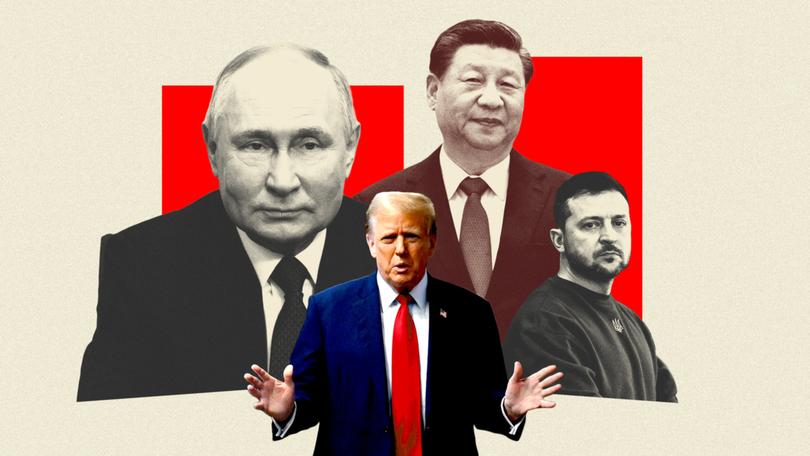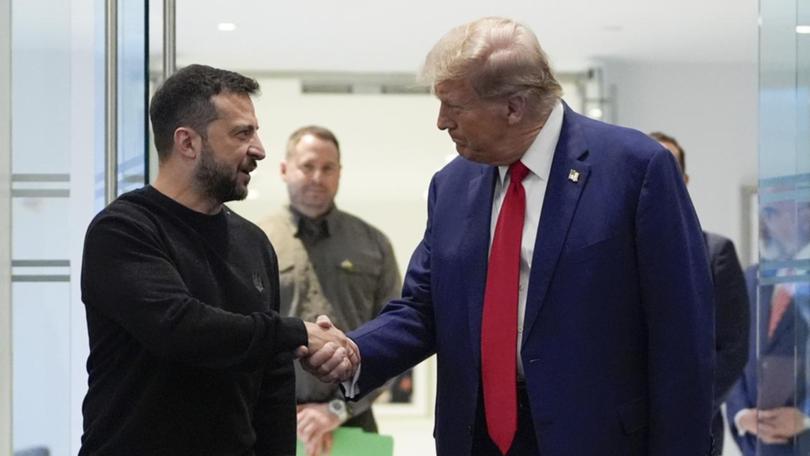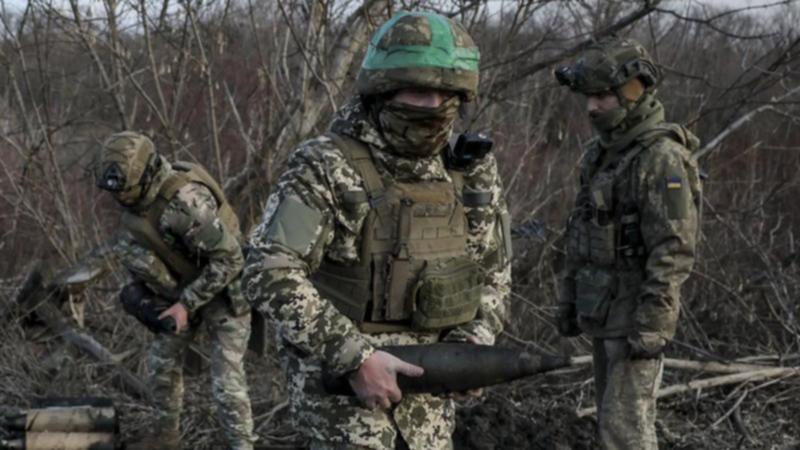Trump think tank says Ukraine’s NATO membership is off the table. So what now for Kyiv?
The President-elect campaigned on a vow to end the conflict within his first 24 hours of being back in the White House. So what are the implications of his decision to revise that timeframe?

Even President-elect Donald Trump can see past his formidable ego to concede the obvious: the war in Ukraine won’t be solved on his first day in the Oval Office.
While the President-elect campaigned on a promise to have the conflict ended within his first 24 hours back in the White House, that time frame has slid following his re-anointing by the American people.
“I hope to have six months,” Trump said this month during a press conference at Mar-a-Lago. “I hope long before six months.”
Sign up to The Nightly's newsletters.
Get the first look at the digital newspaper, curated daily stories and breaking headlines delivered to your inbox.
By continuing you agree to our Terms and Privacy Policy.His Ukraine envoy Keith Kellogg later told Fox the deadline was within 100 days — by May at the latest.
That’s still an ambitious time frame to try and square what seems an irreconcilable situation given Russian President Vladimir Putin’s desire to subjugate Ukraine against the nation’s wishes.
“The truth of the matter is that in this conflict there is no way Russia takes all of Ukraine,” Marco Rubio told the US Senate at his confirmation hearing to be Secretary of State overnight.
“There’s no way Ukraine is going to push these people all the way back to where they were on the eve of the invasion.
“It’s important for everyone to be realistic, there will have to be concessions by the Russian Federation but also by the Ukrainians.”
Trump’s intent is clear. Less obvious is the how.
“What that master plan looks like — it’s going to be hard work,” Rubio conceded.
“Putin’s goal now is to have maximum leverage so that he can basically impose neutrality on Ukraine, retrofit and come back again and do this in four or five years.”
This, Rubio said, would not be in the United States’ interest. He later added that the President would set the foreign policy and that he as Secretary of State would be executing Trump’s wishes.
With the breakthrough in the Middle East, Trump is emboldened that his style works, specifically his threats of “hell to pay” if Hamas failed to release the hostages by his inauguration shows the might of American power when channelled in this way.
What “hell to pay” would look like, no one ever said. But that’s the point. Unpredictability is a Trumpian signature and strength.
“There are advantages to that I think when you’re dealing particularly with the world’s autocrats,” the UK’s Foreign Secretary David Lammy told The Nightly last week.
But Trump has been less verbally threatening when it comes to Putin — behind the scenes, both sides have been negotiating since Trump’s election.
While the incoming Administration is coy about details, others are clearer about what’s required to shake up the battlefield stalemate.
“We need to support Ukraine more to change the trajectory of the war,” NATO’s boss Mark Rutte told defence chiefs in Brussels this week.
“We all want it to end. But above all, we want a peace to last.”
Trump’s challenge is not just to strike a ceasefire in the Ukraine-Russia conflict but to bring about permanent peace.
And this would involve persuading Putin that the former Soviet-occupied states are no longer “part of the Russian imperium anymore,” as Boris Johnson, who was prime minister of the UK at the time of the full-scale invasion, put it this week.
“It’s over. Over. Over. Over. No more empire Vladimir you f...ing idiot - excuse my language - OK?” Johnson told news site Delfi.
But this message, however colourfully delivered, is falling on deaf ears in the Kremlin.
Nikolai Patrushev, an assistant to Putin who sits on Russia’s security council, told Russian media that: “As for the Russian line in relation to Ukraine, it remains unchanged.”
“It is possible that in the coming year Ukraine will cease to exist at all,” he said.

The Kremlin has said Putin is ready to meet Trump but that any negotiations should be directly with the US and exclude Europe.
Ukraine’s President Volodymyr Zelensky has noticeably lessened his once-dogmatic demands that victory would mean a return to his nation’s borders from before Putin’s annexation of 2014 and begun talking of wanting a just peace.
It’s an important signal because Ukraine is attempting to prove to MAGA enthusiasts that the obstacle is Russia, not Kyiv. If talks collapse, Ukraine can say it was willing to negotiate in a way Putin wasn’t and win US favour.
This is a likely outcome according to Nigel Gould-Davies, a former British diplomat who was the UK’s Ambassador to Belarus and also served in Moscow.
“The hope or any expectation that there’ll be any early end to the war is greatly oversold,” Mr Gould-Davies, now a senior fellow at the International Institute for Strategic Studies in London, said in an interview.
“There’s no evidence that Putin has abandoned his initial primary goals of the invasion.
“Every sign says that his theory of victory is being vindicated, which consists of wearing down Ukraine militarily and outlasting the West politically.”
Mr Gould-Davies believes there is only one way to force Putin to the negotiating table.
“Achieving control of Ukraine is such a high priority for Putin, that the only higher priority is the survival and security of his own regime,” he said.

“And it’s only at the point where continuing the war brings that into question that he might be prepared to compromise.”
This is why Trump’s quest for peace through strength may need to involve even more fighting and greater US military support — as NATO’s Mark Rutte argued.
Some are heartened by an article Trump’s pick for National Security Adviser Mike Waltz co-authored just before the US election in The Economist, which argued that surging weapons and capability to Ukraine might be one way of shaking up the current stalemate in Kyiv’s favour.
But Trump has been personally critical of the Biden Administration’s belated decision to allow Ukraine to use Western-supplied missiles to attack targets deep inside Russia.
Trump, as we know, can change his mind on any given day and depending on with whom he last spoke.
But the uncomfortable truth is that while Rubio, once derided by Trump as “Little Marco”, doesn’t fit in this camp, other influential parts of Trump’s MAGA base, such as Tucker Carlson, are deeply anti-Ukraine and open admirers of the Russian President.
Former Prime Minister Tony Abbott once dubbed this “Putin Fascination Syndrome”.
But you don’t have to be enamoured with Putin to hold Ukraine-sceptic views — and it’s that sort of perspective that is likely to prevail in the second Trump administration.
Kevin Roberts, head of the Heritage Foundation, is a case in point.
Speaking at a private dinner hosted by the Henry Jackson Society in London before Christmas, he said NATO membership for Ukraine was “off the table, from our vantage point.”
When pressed by The Nightly on why, he said: “Because it is one of the reasons the war started.”
NATO’s eastward expansion has been the reason Putin has proffered for his illegal war, which has also prompted two countries, including neighbouring Finland, to join the Alliance. And yet Putin has made no moves on the Finns despite his border with NATO essentially doubling overnight.
Denying Ukraine entry to NATO is not just a MAGA viewpoint. The Biden Administration also opposed it and so too does Germany. Despite NATO members’ talk that Ukraine belongs in the Alliance, no one is willing to say when.
And if Trump manages to get the two sides to agree to a deal, the United States will offload the responsibility for preserving continental peace to the Europeans who will likely have to back any security guarantees with boots on the ground.
Figures in Brussels who have met with Trump’s incoming team expect the Americans to withdraw support from Ukraine so the US can focus on the Indo-Pacific and deal with its superpower rival China.
But this America First approach could backfire.
From Taipei, Ukraine doesn’t feel like a distant conflict.
China will “take it as a hint” that in a battle of endurance “the United States and its allies are going to back off,” Joseph Wu, Taiwan’s national security adviser and former foreign minister told The New York Times last year.
Mr Wu said the Chinese would think: “OK since Russia could do that, we can do that as well.”
Taiwan’s former President Tsai Ing-wen was more forthright: “A Ukrainian victory will serve as the most effective deterrent to future aggression.”
Trump’s pledge to end the war quickly shows how deeply invested he is in a swift solution, said Mr Gould-Davies.
“But if and when his politics start to fail, how does he respond?”

